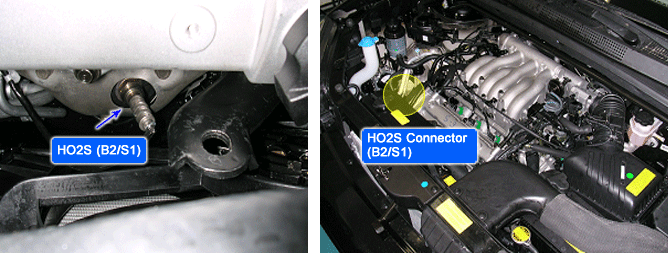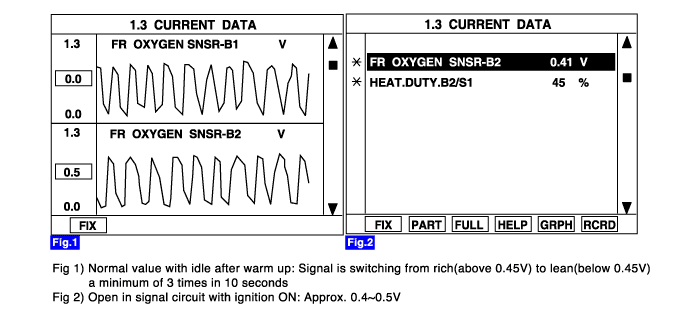

The HO2S is used to supply the ECM with information regarding the composition of the air/fuel mixture. The HO2S is positioned in the exhaust pipe ahead of the TWC. To measure the oxygen content, the HO2S requires a supply of ambient air as a reference. Since this is supplied through the wiring, the lead must not be clamped or damaged in any other way. The HO2S produces a voltage that varies between 0.1V and 0.9V under normal operating conditions. The Engine Control Module (ECM) monitors this voltage and determines if the exhaust gas is lean or rich. If the voltage input at the ECM is under approx. 0.45V the exhaust is lean, and if the voltage input is over approx. 0.45V the exhaust is rich. The ECM constantly monitors the HO2S signal during closed loop operation and compensates for a rich or lean condition by decreasing or increasing injector pulse width as necessary.
The ECM monitors front oxygen sensor amplitude level and compares it to predetermined minimum amplitude value which could increase emission or disturb lambda control by the effect of aging on the oxygen sensor. The ECM sets DTC P0153 when the amplitude of oxygen sensor is equal to or less than minimum amplitude threshold.
ITEM | DETECING CONDITION | POSSIBLE CAUSE |
DTC Strategy | ● Comparison of O2 sensor lean/rich period with calculated period | ● Leak in intake or exhaust system ● Faulty fuel system. ● Front and rear HO2S connections reversed. ● Contact resistance in connectors ● HO2S contamination |
Enable Conditions | ● 400℃(752℉)〈 Catalyst Temp.Model 〈900℃(1652℉) ● Coolant temp. 〉70℃(158℉) ● 1200 〈Engine speed(RPM) 〈3000 ● 300〈Mass air flow(mg/rev.) 〈840 ● No misfire detected ● Not transient condition | |
Threshold Value | ● Sum of O2 sensor lean/rich period > calculated period | |
Diagnostic Time | ● 70 lambda controller cycles |
